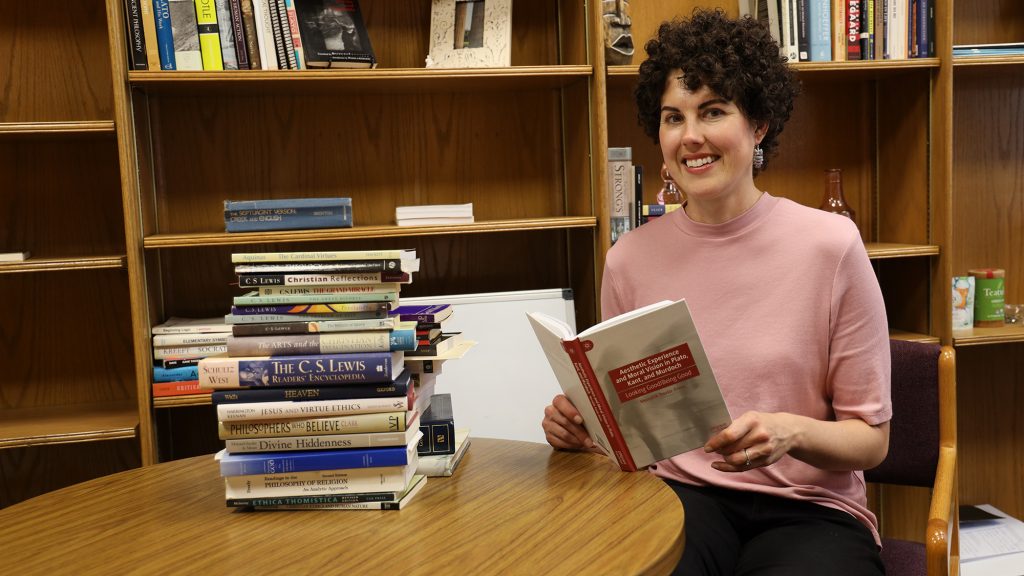A small college in central Kansas is not usually considered a center of formal philosophic thought.
But Meredith (Trexler) Drees, Ph.D, assistant professor and chair of the Department of Religion & Philosophy, at Kansas Wesleyan University, could change that.
Drees has been named a research fellow for 2022-23 at the Center for Philosophy and Religion at the University of Notre Dame. Other fellows have been from the top universities in the country and the world.
She will be the aesthetics speaker at the 2022 Rutgers Summer Institute for Diversity in Philosophy, representing the American Society for Aesthetics.
And she has been asked to talk about her 2021 book at the Iris Murdoch Society this summer in Chichester, England. Murdoch was a 20th-century Irish-English novelist and philosopher.
These invitations have come partly because of her book, “Aesthetic Experience and Moral Vision in Plato, Kant, and Murdoch: Looking Good/Being Good.”
The book’s editor and someone who had reviewed it recommended Drees for the fellowship at Notre Dame, which will start Aug. 15 and go through May 15.
“I had written an outline of another book, which results from some questions that came out of the first one,” Drees said. “This outline is for another eight-chapter long book. They expect me to have that completed by the time I leave in May — a chapter a month!”
The first book addresses the ways in which Plato, Kant, and Iris Murdoch share the thesis that aesthetic experience is connected to morality. Immanuel Kant was an 18th-century philosopher.
The subtitle is a pun, Drees said: “Looking good” doesn’t refer to being attractive but to being good at looking.
“The reason for my title is that Iris Murdoch’s view of what it means to be good is to truly look at other people, as to be able to see them for who they truly are.”
The second book will look at questions mostly centered around Kant’s religion and questions Murdoch raises. One of the questions is, is forgiveness possible without God. This book won’t include Plato.
“Then I’ll be looking at interpretations of love and virtue and forgiveness,” she said, because that is also the theme of the fellowship.
The Rutgers Summer Institute will be all about diversity, equity and inclusion, Drees said.
“I’m going to be talking about how this idea of looking that Murdoch has helps us to really see other people and pay attention to them and in that sense promotes inclusion, she said. “We’re not ‘othering,’ we’re including, appreciating other people.”
Despite all the recent attention Drees is getting, she’s far from an overnight success.
“I spent nearly 20 years working on some of these topics,” she said. “I started working as an undergraduate on the connections between ethics and aesthetics.”
She worked on the final edits of her book while undergoing chemotherapy for breast cancer.
It was a tough time, she admitted, but she had to “transition to gratitude to get through it. If you see it as this thing that’s negative, it can just eat away at you. But if you see it as something positive, you can grow from it.
“When I had cancer, I was focusing on goals and dreams, because I didn’t want to focus on I’m going through chemo. Looking ahead is part of what got me through it. It served a purpose – it propelled me forward to the other side.”
Drees has been at KWU since 2013, when she joined the faculty as an adjunct, teaching ethics. In 2015 she became a full-time faculty member, and this spring passed her tenure review.
She’s as enthusiastic about teaching as she is about her research. She was voted KWU’s 2019-20 Exemplary Teacher of the Year.
The stereotype is you have to be a researcher or a teacher, but Drees thinks it’s possible to do high-level research and teach.
“You can do it all – you can be really connected and support your students, and your research should inform what you’re doing with your students,” Drees said. “My secret is I’ve tried to make it all holistic and make it work together.”
Story by Jean Kozubowski


